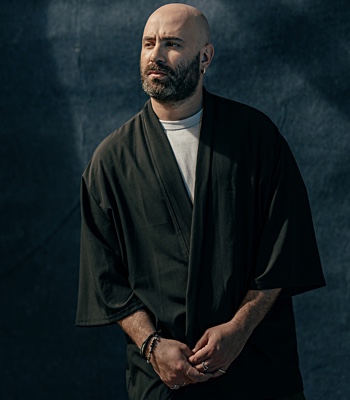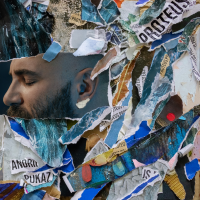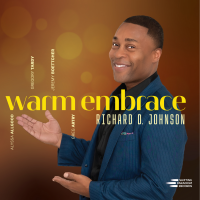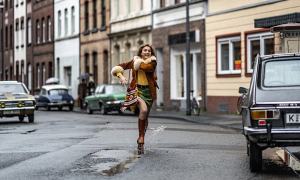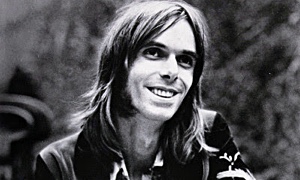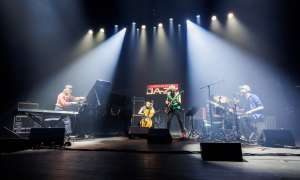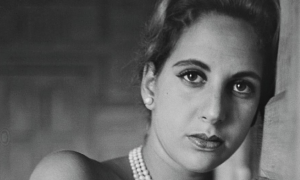Home » Jazz Articles » Film Review » Sabbath in Paradise
Sabbath in Paradise
 Claudia Heuermann
Claudia Heuermann Sabbath in Paradise
Tzadik
2007
Fifteen years ago, saxophonist/producer John Zorn and several of his downtown NYC musical cohorts held what was termed a "Radical New Jewish Culture Festival in Munich, Germany. Shortly thereafter, a similar event was held at NYC's Knitting Factory. At that time, Zorn and his generation of downtown's avant-garde, while decidedly international, included a large number of Jewish musicians. Initially inspired in part by the free jazz of Ornette Coleman these musicians were coming to grips with their Jewish identity within the milieu of a recent klezmer revival and the up-front Afro-American ethnicity of rap music. In the process, they began to create exciting new music that started to define itself as a Radical Jewish Culture (RJC).
When RJC was about five years old, German filmmaker Claudia Heuermann perceptively caught the "scene in her quasi-documentary Sabbath in Paradise. Set against the Yiddish folktale of the same name, the film artfully retells the story of a Rabbi who finds himself spending a Sabbath, literally in paradise, with Moses, Abraham and King David. Heuermann utilizes clever NYC visuals that correspond to a reading of the story while interspersing interviews with seminal RJC musicians such as pianist Anthony Coleman, clarinetist David Krakauer, trumpeter Frank London, guitarist Marc Ribot, clarinetist/mandolinist Andy Statman, saxophonist Roy Nathanson and accordionist Michael Alpert. Noteworthy, is the breadth of the, at the time, still nascent RJC community with intimate performances by Masada, Ribot, Coleman with both the Self Haters and Sephardic Tinge and Statman, among others. The film succeeds as a document that preserves that special moment in time when RJC was revolutionary while raising poignant questions about the music and Jewish identity in general—questions such as: Is the music of RJC really Jewish music? and How is Jewish identity expressed through RJC?
Ten years and over 120 CD releases later, some of these questions have begun to be answered while new ones have arisen. During that time a new generation of musicians has embraced the RJC mantra and a bonus 50 minute documentary has Coleman considering the past decade and Zorn offering very personal reflections on the beginnings and meaning of RJC. In addition, through video and interview, insights are given into the way he composes, most specifically in the context of his monumental Masada songbook. A new slate of musical performances and interviews with young musicians such as trumpeter Steven Bernstein, guitarist Jon Madorf, bassist Shanir Blumekranz and keyboardist Jamie Saft reveal how far RJC has come and that it is definitely still alive and well. As many of these same musicians join others from all facets of Jewish music this month for "A Great Day on Eldridge Street," a photographic celebration of Jewish music capped by a concert and tour, the re-release and updating of this insightful documentary is timely. A "must-have for those with even a passing interest in Zorn and his multitude of projects and a treasure for those who consider themselves a part of the RJC "community."
Personnel: Written and directed by Claudia Heuermann and featuring Anthony Coleman; David Krakauer; Frank London; Roy Nathanson; Andy Statman; John Zorn; Milchael Alpert; Mark Ribot.
Production Notes: 85 minutes. Color, black and white. 2007 DVD-Video, Widescreen, NTSC. Aspect ratio: 1.77:1. German film made in 1998 with bonus documentary footage added for new edition. Distributed on Tzadik label by Koch Entertainment.
Tags
PREVIOUS / NEXT
Support All About Jazz
 All About Jazz has been a pillar of jazz since 1995, championing it as an art form and, more importantly, supporting the musicians who make it. Our enduring commitment has made "AAJ" one of the most culturally important websites of its kind, read by hundreds of thousands of fans, musicians and industry figures every month.
All About Jazz has been a pillar of jazz since 1995, championing it as an art form and, more importantly, supporting the musicians who make it. Our enduring commitment has made "AAJ" one of the most culturally important websites of its kind, read by hundreds of thousands of fans, musicians and industry figures every month.








